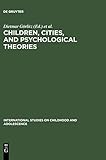Children, Cities, and Psychological Theories : Developing Relationships / ed. by Dietmar Görlitz, Günter Mey, Hans Joachim Harloff, Jaan Valsiner.
Material type: TextSeries: International Studies on Childhood and Adolescence : ISCA ; 5Publisher: Berlin ; Boston : De Gruyter, [2012]Copyright date: ©1998Edition: Reprint 2012Description: 1 online resource (688 p.)Content type:
TextSeries: International Studies on Childhood and Adolescence : ISCA ; 5Publisher: Berlin ; Boston : De Gruyter, [2012]Copyright date: ©1998Edition: Reprint 2012Description: 1 online resource (688 p.)Content type: - 9783110146035
- 9783110885194
- 155.4 21
- HT206 .C444 1998eb
- online - DeGruyter
- Issued also in print.
| Item type | Current library | Call number | URL | Status | Notes | Barcode | |
|---|---|---|---|---|---|---|---|
 eBook
eBook
|
Biblioteca "Angelicum" Pont. Univ. S.Tommaso d'Aquino Nuvola online | online - DeGruyter (Browse shelf(Opens below)) | Online access | Not for loan (Accesso limitato) | Accesso per gli utenti autorizzati / Access for authorized users | (dgr)9783110885194 |
Frontmatter -- Contents -- Keynote -- Foreword -- How it all began – Background to this book -- Part I. Prelude and dedication -- Themes in the relation between children and the city -- Children’s life worlds in urban environments -- Toward a functional ecology of behavior and development: The legacy of Joachim F. Wohlwill -- Part II. Exposition of theoretical perspectives -- Introduction -- A. Levels of relationship – As they appear in different cultures -- Introduction -- A dialectical/transactional framework of social relations: Children in secondary territories -- Comment: Proving philosophy!? -- Authors’ response: Translating a world view -- A contextualist perspective on child-environment relations -- Comment: Clarifying fusion -- Child development and environment: A constructivist perspective -- Comment: Constructivist potentialities and limitations -- Author’s response: Following Aristotle -- Integration: What environment? Which relationship? -- Β. Transactional, holistic, and relational-developmental perspectives on children in the cities -- Introduction -- Transactionalism -- Comment: Transactionalism – What could it be? -- Author’s response: Is Lang going beyond? -- A holistic, developmental, systems-oriented perspective: Child-environment relations -- Comment: Werner augmented -- Relational-developmental theory: A psychological perspective -- Comment: From the general to the individual or from the individual to the general? -- Author’s response: General and individual – A relation -- Integration: Dimensions of a conceptual space – But for what? -- C. Modern versions of Barker’s ecological psychology and the phenomenological perspective -- Introduction -- Children’s environments: The phenomenological approach -- Comment: Don’t forget the subjects – An approach against environmentalism -- Authors’ response: Reading a text – A case study in perspectivity -- Commentators’ reply: Seductive sciences -- Behavior settings in macroenvironments: Implications for the design and analysis of places -- Comment: Behavior setting revitalized -- Behavior settings as vehicles of children’s cultivation -- Comment: Behavior settings forever! -- Integration: Ecological psychology and phenomenology – Their commonality, differences, and interrelations -- D. Sociobiology, attachment theory, and ecological psychology – Marching towards the city -- Introduction -- Exploratory behavior, place attachment, genius loci, and childhood concepts: Elements of understanding children’s interactions with their environments -- Comment: Gender are two -- Author’s response:... but different ones -- Children in cities: An ethological/sociobiological approach -- Comment: And ethology? -- Author’s response: Adaptive variations and the individual -- Street traffic, children, and the extended concept of affordance as a means of shaping the environment -- Comment: Children as perceivers and actors – The view from ecological realism -- Authors’ response: Environmental design means the design of affordances -- Commentator’s reply: The extended concept reconsidered -- Integration: The path to integration is not straight -- Reflections: What has happened in treading the path toward a psychological theory of children and their cities -- Part III. The Finale -- Integrating youth- and context-focused research and outreach: A developmental contextual model -- The young and the old in the city: Developing intergenerational relationships in urban environments -- Where we are – A discussion -- Appendix -- Biographical notes -- Subject index -- Author index
restricted access online access with authorization star
http://purl.org/coar/access_right/c_16ec
Issued also in print.
Mode of access: Internet via World Wide Web.
In English.
Description based on online resource; title from PDF title page (publisher's Web site, viewed 29. Jun 2022)


